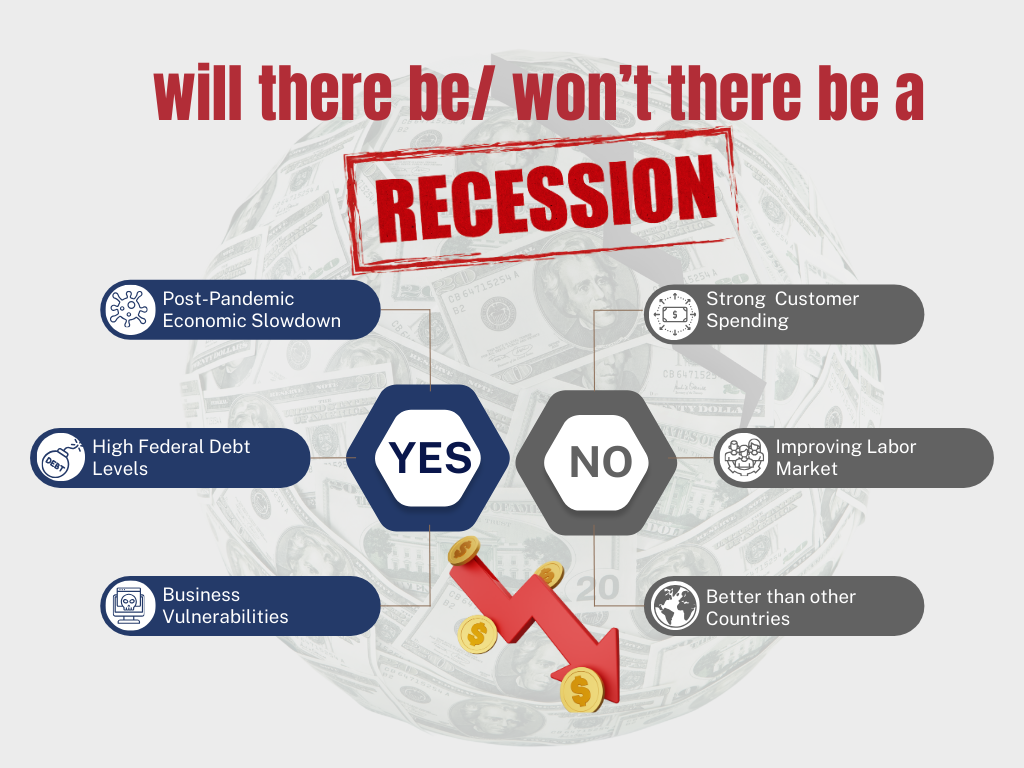Super Tuesday is over, so now what? It looks pretty certain who the candidates for the Republican and Democrat parties will be and the inevitable mudslinging that’s about to enter overdrive will take away the focus from the real issues for the economy and the impact that has on small businesses in the USA.
As we navigate the tumultuous waters of 2024, the economic outlook for small business owners in the USA presents a landscape of both challenges and opportunities. With the memory of the pandemic still fresh, and amidst a backdrop of evolving fiscal policies and market dynamics, it’s a pivotal moment for small businesses. The resilience and adaptability they’ve historically shown will once again be tested.
Will we avoid a recession? There are always ups and downs, and typically a recession occurs on average every four or five years in the USA. I even did a thought leadership video on this very subject in June 2019 when we were already overdue as it had already been more than 10 years since the last significant recession in 2008.
Should this year’s election make small business owners worried?
The 2024 U.S. election could have significant implications for small business owners, although the degree and nature of the impact will vary depending on several factors.
According to the NFIB (National Federation of Independent Business), the election could be a decisive factor in determining the outlook for small businesses. The NFIB Small Business Optimism Index has been below its 50-year average for the last 24 months, indicating that small business owners remain pessimistic about economic prospects. The election’s outcome in November is anticipated to have a major impact on this sentiment, potentially affecting spending and growth for small businesses. It’s expected that the election results could either enhance or diminish small business optimism, depending on the policies and economic approaches of the elected candidates.
Furthermore, the Stanford Institute for Economic Policy Research (SIEPR) highlights that the U.S. economy is strong by objective measures such as low unemployment, robust GDP growth, and easing inflation. However, there’s a disconnect between these strong economic indicators and consumer sentiment, which is relatively weak. Consumer sentiment often has a strong correlation with election outcomes, making it especially important to understand this disconnect in an election year. The sentiment is also being influenced by prior years’ inflation, which, if it continues to ease, could lead to an improved outlook over the next year.
Did The COVID-19 Financial Relief Programs Avert a Recession?
There’s no doubt the government funded financial relief programs given to businesses during the Covid-19 pandemic such as the Paycheck Protection Program (PPP) and Economic Injury Disaster Loans (EIDL) and various tax incentives and deferrals helped massively. Evidence certainly suggests they played a significant role in cushioning the U.S. economy from the pandemic’s worst impacts, but they could have contributed to either delaying or preventing the next downturn from happening altogether. The effectiveness of these relief programs can be gauged by looking at several economic indicators:
- Employment Rates: Despite initial spikes in unemployment due to the pandemic, the job market showed remarkable resilience. The relief programs played a significant role in curbing what could have been a more severe employment crisis.
- Business Continuity: Many businesses that might have otherwise shut down were able to continue operations, thanks in part to the financial support they received.
- Economic Recovery Trajectory: Post-2020, the U.S. economy began to show signs of recovery at a faster rate than initially expected. While not solely attributable to the relief programs, these measures undoubtedly contributed to this rebound.
- Market Confidence: The quick and decisive action by the government in deploying these relief programs helped in restoring investor and consumer confidence, which is vital for economic stability.
Will the USA Face a Recession in 2024? Diverse Economic Perspectives
So, that question still looms large over the U.S. economy: are we headed towards a recession? Economists and financial experts present varied views on this matter, each supported by differing analyses and indicators. If I had a crystal ball, I’d be able to answer that and predict the Mega-Millions lottery numbers and live in the Cayman Islands, but as I don’t, here are a few reasons why some “experts” believe a recession is imminent, and why others argue that the economy might just steer clear of it.

The Case for a Recession
- Economic Slowdown Post-Pandemic – A significant concern is the deceleration of economic growth post-COVID-19. After the initial rebound from the pandemic, there are signs that this growth is losing momentum. The anticipated slower pace of expansion in GDP, driven by reduced consumer spending and a potential drag from fiscal spending, points towards a cooling economy.
- High Federal Debt Levels – The U.S. currently faces high levels of federal debt, comparable to post-World War II levels. This scenario, coupled with ongoing commitments such as pensions and healthcare, poses a significant financial strain. Experts worry that this might limit the government’s ability to respond effectively to economic crises, potentially paving the way for a recession.
- Business Vulnerabilities – Increasing business bankruptcies is another worrying sign. A surge in bankruptcies could have broader economic repercussions. High interest rates and slowing revenue growth will also severely impact all businesses, affecting both profitability and their ability to borrow at rates they can afford.
The Case Against a Recession
- Strong Consumer Spending – Despite some headwinds, consumer spending remains robust, bolstered by rising wages and decreasing inflation. This consumer behavior is a significant pillar of the U.S. economy, suggesting resilience against a downturn.
- Improving Labor Market – The U.S. labor market appears robust, with a very low unemployment rate and a trend of average hourly earnings outpacing the rise in the consumer price index. A strong labor market typically supports economic growth and consumer spending, reducing the likelihood of a recession.
- Favorable Comparison with G7 Countries – When compared with other G7 countries, the U.S. is on relatively solid economic ground. With higher real GDP growth and downward-trending inflation, the U.S. economy shows signs of resilience that might help it avoid a recession that other industrialized countries might face.
February 2024 saw commercial Chapter 11s surge 118%
This article from Yahoo Finance talks about the numbers of chapter 11 bankruptcy filings seen last month. An increase of 118% is a number that should bring a degree of concern and could be an indication of some future bumps in the road. 2023 saw a higher than normal level of bankruptcy filings after two years of relative calm. I don’t think anyone that follows company performance was surprised by Rite Aid, Bed, Bath & Beyond, David’s Bridal and much to my wife’s dismay, Tuesday Morning, but maybe raised an eyebrow over SVB Financial, First Republic Bank, Yellow Trucking and Convoy.
Bank failures do not automatically point towards a recession. However, many factors coupled alongside a troubled bank climate can lead to recession or economic collapse. A stressed banking environment can lead to even more small banks closing their doors, affecting small business lending, individual accounts, and overall economic prosperity, none of which are good for the economy.

Is the Trucking industry a barometer of the economy?
The trucking industry is often regarded as a crucial indicator of the health of the economy as it is a vital part of the supply chain, responsible for moving a significant portion of goods across the United States. This includes everything from raw materials to finished products, making it a critical component in both production and distribution processes. A drop in freight volume is often associated with a decrease in demand, which in turn, could lead to a recession.
Back to the bankruptcy filings in 2023. The names Yellow Trucking or Convoy may not be as familiar to many people as the failed big box retailers and banks, but for those that are involved in the transportation and logistics industry like we are, they will be. When 99-year-old Nashville-based trucking giant Yellow Corp., filed for chapter 11 protection in August 2023, with $1.2 billion in debt, it certainly shook the transportation sector. The reason for its demise blamed on a labor dispute with a union a little more than a week after it terminated its 30,000 employees and yet it benefited from $700 million in unrepaid pandemic relief funds. While there had been some rumbling about Yellow’s issues for a while, Convoy, was a digital freight network that went from a $3.8billion valuation to a shutdown in just 18 months despite early backing from the likes of Jeff Bezos, Bill Gates and Bono from U2 – a total shock for many. Convoy had promised to transform the freight brokerage process from phone calls and fax machines to the automated paring of drivers and loads. It turns out that wasn’t as easy as they thought! The business focus on high volume, low margin freight was ill-equipped to handle the downturn in demand and freight rates experienced by so many in the sector turned into $10 million a month unsustainable loss making entity and attempts to sell the business fell through.
Conclusion: Yes, There Is An Uncertain Road Ahead. So Buckle Up and prepare your business now. It Might Get Bumpy
The economic outlook for 2024 definitely remains mixed, with valid arguments on both sides of the “will there/ won’t there be” recession debate. While concerns like high federal debt, potential small business challenges, and slowing GDP growth are significant, the strengths of the U.S. economy – robust consumer spending, a strong labor market, and favorable comparisons with other major economies – offer hope for stability.
Ultimately, the trajectory of the U.S. economy in 2024 will depend on a complex interplay of these factors, along with overseas conflicts, election results in the USA and several major economies such as Russia, the UK and India, and any unforeseen global events and policy responses. As such, businesses and individuals alike would do well to stay informed and be prepared for a range of economic scenarios. My best advice to all small business owners is evaluate your short, medium and long term funding needs while you have options. Once there is a downturn, the lending environment becomes a very different place and viable options are likely to be less attractive.

Ian Varley is a seasoned business leader and financial industry expert with a passion for delving into complex topics and presenting them in an easy to understand manner. With over 35 years of experience in corporate finance, he brings a unique perspective that combines in-depth knowledge and practical experience. Ian has worked in various capacities within the industry, from hands-on operational roles to senior leadership positions. He has been instrumental in the creation and development of several business operations over his extensive career. Ian has become a respected voice in the Invoice Factoring and Asset Based Lending community, both in the UK and USA. When not running Eagle Business Credit or writing his next blog post, Ian enjoys both overseas and domestic travel and has driven around the country in his RV. Follow Ian for more thought-provoking content and industry insights.
Ian Varley, CEO, Eagle Business Credit, LLC
855-420-8318

